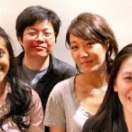

The Asian Pride Project (APP) is honored to be selected as a White House Champion of Change.
APP is a multimedia platform that aims: to foster greater visibility, pride, acceptance, unity and harmony for all lesbian, gay, bisexual, and transgender (LGBT) Asians & Pacific Islander (API) people in our families, cultural communities and beyond -- no matter where we are. We believe in the power of sharing, connecting, and relating to give API families and communities the support they need when struggling with the challenges of our sexual and gender identities in the API cultural context.
This project was borne out of a hope to create opportunities for connection and communication through written stories, letters, essays, poetry, graphics, video clips, photos and art. In 2009, a small group of activists discussed the lack of resources and support for Asian & Pacific Islander (API) family members of lesbian, gay, bisexual and transgender (LGBT) people. While many members were "out" to friends, few were "out" to their families, a common experience of Asian and Asian Americans who identify as lesbian, gay, bisexual or transgender. A combination of societal stigma and the lack of culturally-relevant, language-specific resources for our families to use made the struggle for acceptance even more difficult for families struggling to accept their "out" children.
Today, the Asian Pride Project is on the road to becoming a shinning example of LGBT visibility and support among all Asian and Pacific Islander groups and our families and communities.
Grounded in this vision is the idea that we all have stories to share. These stories may speak of fear, humiliation, bullying, and shame. These same stories, however, may also be stories of courage, resilience, community, love and the power of change.
The six leaders, steering committee members of Asian Pride Project, recall their own experiences:
Elena remembers having a friend who always kept her laughing, reminding her that she was not the only one who had difficulty articulating her sexuality to her Korean parents. She remembers that same friend taking her own life in 2008.
Suma remembers struggling with her sexuality for nearly a decade, and across three continents, based out of a fear of rejection from her Indian Hindu family – the same family who loves her and accepts her for who she is, teaching her that sometimes our families can surprise us in amazing ways.
Ryan remembers how his short haircuts amplified the strain of his relationship with his parents, and of how he avoided conversations with his parents because, while his gender and sexuality was on the forefront of his mind, he couldn't actually talk about his gender and sexuality. While now his mother now will nag him if his hair starts getting too long, his parents do not know his chosen name and do not treat him as a son.
Dennis remembers that one car ride with his mother when she asked him if he was gay. He remembers deflecting the question and later feeling disappointed in himself for not taking that opportunity to come out to her. Looking back, he realizes that she wasn't looking for an answer. She was trying to tell him that she was there for him no matter what. And six years later, she still is.
Aries remembers how her mother struggled with her coming out. There were tears, threats, words, and silent treatments. This went on for years. Her mother has come a long way to accept her daughter's sexual orientation, after many conversations and a strong will to keep the family together. In the past five years, she has been very supportive to the LGBTQ community, and has been nothing but loving and helpful towards her new family. However, she has not been able to share her stories or her new family with her friends and relatives after all these years. She is afraid that they will not understand, still.
Jason remembers being sent to an Exodus Ministries conference after coming out to his conservative Christian parents. He remembers tearful nights, praying to God for a "cure." Nine years later, he remembers introducing his parents to his partner and bringing them to his queer-affirming church.
These stories represent a small fraction of the amazing journeys that our fellow LGBT API peers, and their family members, have taken on the road to accepting themselves, accepting each other and becoming proud members of our communities. Our goal is to demonstrate the power of visibility to lead to acceptance and, ultimately, equality in our cultural communities.
Elena Chang and Suma Reddy, along with the Asian Pride Project (APP), aspire to foster greater visibility, pride, acceptance, unity, and harmony for all lesbian, gay, bisexual, and transgender (LGBT) Asians & Pacific Islander (API) people in our families, cultural communities and beyond.
Check out the Asian Pride Project's "What's Your Story" video submission:


